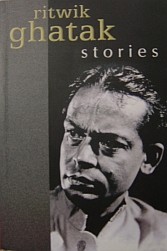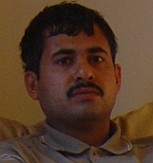Stories of Ritwik Ghatak
 Ritwik Ghatak, the veteran filmmaker from Bengal, had written poems and short stories before he started directing films. He continued to write stories even after he entered film field. The book from Srishti publishers has a collection of 17 short stories by Ghatak, translated by Rani Ray.
Ritwik Ghatak, the veteran filmmaker from Bengal, had written poems and short stories before he started directing films. He continued to write stories even after he entered film field. The book from Srishti publishers has a collection of 17 short stories by Ghatak, translated by Rani Ray. Unlike Satyajit Ray, story writing was not a "second love" for Ghatak, Sumanta Banerjee writes in the introductory note: "They belong to a phase in his life which could be described as that of his 'first love' ... Ritwik's short stories were an outcome of a brief sojourn during the intellectual odyssey of his." Most of the stories were written during the period 1947-50, and they throw light on the various facets of the great artist. Some of the stories have clear political statements of the author, who was a "fellow-traveler" of the Communist party. Stories like The Earthly Paradise Remains Unshaken and The Crystal Goblet are about the tragedy of Partition, and Eyes and Comrade have trade union struggles portrayed in them. Few stories look like narrations of dreams, and some of the stories, like the 3-page long The Tree, look beautiful with their simplicity. Many of the stories in this book make a good reading.
My favorite short stories in this collection are Shikha and Touchstone, both written in the form of memoirs. In Shikha, the narrator looks at an old, fading photograph of his niece, which had captured a brief moment in the little girl's private life, enjoying some eatables stealthily. The girl, in spite of being the only daughter of rich parents, had a pure, gentle and imaginative mind, sensitive to the human struggles, and she used to say that 'she would donate all her money to poor people when she grows up'. The narrator hadn’t been in touch with her for several years, and wonders how she would have grown up. However, he is disappointed when he meets Shikha after several years - now she is a sophisticated young lady who is married to a rich man, and has lost all her innocence.
In Touchstone, a classical singer remembers a performance he had given several years back, and about an admirer named Chandrakanta whom he had met with during that time. Chandrakanta was a strange man, with a secret mission in his life - to obtain the "formula" for bringing dead people back to life. He already had got the mantra and the recipe for the medicine; All he wanted was to go to distant places in the Himalayan ranges, and collect the ingredients for the medicine. The singer tells his admirer that his whole-life earnings wont be sufficient to meet the travel expenses, and this forces Chandrakanta to look for shortcuts for making money. After several years, the singer wonders what would have happened to Chandrakanta . He secretly wishes that his admirer would have found the ingredients for the magic medicine, finally. But a twist at the end of the story reveals the tragedy of Chandrakanta.


0 Comments:
Post a Comment
<< Home